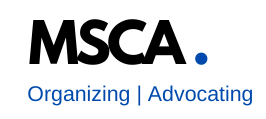MSCA Board Rejects SSU Furlough Proposal
July 13, 2020
Dear MSCA librarians and faculty,
On July 8, 2020 I wrote to you to let you know that Salem State University had contacted the MSCA and requested mid-term negotiations on a furlough proposal.
The MSCA Board of Directors considered Salem State University’s request at a special meeting on Friday, July 10, 2020. The Board voted – unanimously – not to authorize the MSCA day Bargaining Committee to enter mid-term negotiations. Under the MSCA Constitution, the Bargaining Committee can negotiate on our members’ behalf after first being authorized to do so by the Board.
Please read the Salem State University chapter of the MSCA’s response here.
The MSCA is committed to the financial viability of the Salem State University. The MSCA is committed to the financial viability of all nine state universities, all 15 community colleges, and all five campuses of the University of Massachusetts.
However, I believe the furloughing of faculty and librarians – who are the heart and soul of the any college or university and particularly of public colleges and universities – is not necessary, is ill-advised and would do long-term damage for a short-term budget crisis.
We are aware that the crisis is real, more so than management can know. After all, we were essential workers during the spring. We moved nearly every single class online or taught remotely from our homes. We live with the constant anxiety of not knowing how we will be teaching come September 1st, just seven weeks away.
Salem State University wanted to show their appreciation for your hard work, dedication and sacrifice (yes, there has already been significant sacrifice) by asking most MSCA members to:
- Take a 12.8% pay cut
- Prepare for the Spring 2021 semester, during the Fall 2020 semester, while simultaneously preparing to switch to remote/online teaching with little or no notice, and
- Reduce their pension – for life
The MSCA is prepared to help Salem State University – and the other state universities as needed – find ways to mitigate the crisis without bearing the brunt of the pain.
Furthermore, it is necessary to note that the crisis at Salem State University was not created by the COVID-19 pandemic; it was exacerbated by the pandemic.
CJ O’Donnell
MSCA President
